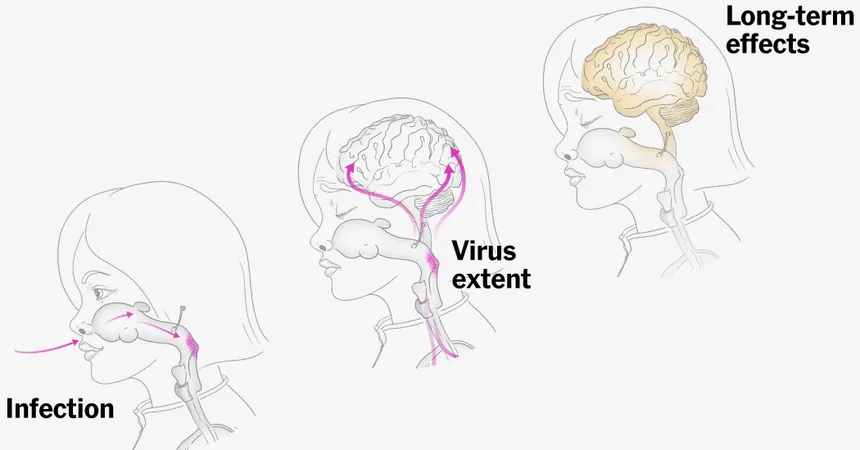
The Devastating Impact of Measles on Unvaccinated Children: A Deep Dive
2025-04-06
Author: Ming
Measles, a highly contagious virus, poses a serious threat to unvaccinated children, making any public space—from classrooms to grocery stores—a potential site of infection. Alarmingly, research shows that around 90% of unvaccinated individuals exposed to the virus will contract it. Once inside the body, measles can wreak havoc on vital organs including the lungs, kidneys, and brain.
As vaccination rates in the U.S. see a troubling decline, recent outbreaks have resulted in over 580 cases and at least two fatalities. Health experts are raising alarms that measles could endanger even more children across the nation. But how does this dangerous virus infiltrate and take control of a child's body?
Unlike many other viruses that depend on direct contact for transmission, measles can linger in the air for up to two hours after an infected person departs, making environments supremely risky. An unvaccinated child can become infected simply by inhaling virus-laden droplets left in the air from a previous occupant.
Once the virus enters through the nose or mouth—or even through eye contact—its journey begins. In the first 24 hours, it attaches itself to cells in the nasopharynx and begins its march toward the lungs. This sets the stage for the virus to multiply, building an army to launch a broader attack on the immune system.
It can take up to two weeks (with variability between one and three weeks) for symptoms to emerge. During this incubation period, the child may feel perfectly healthy, but the virus is already ravaging the body. As its numbers swell, measles spreads to lymphoid tissues, and eventually, the entire body, leading to the onset of symptoms.
After several days, the child will likely develop a fever, sensitivity to light, and gastrointestinal issues, alongside potentially developing characteristic white spots on the inner cheeks. Following this, the telltale red rash begins, usually starting on the face and progressively spreading down the body.
While many initial symptoms may resolve on their own, complications can arise, particularly if a fever persists for more than a few days after the rash appears. It is during this stage—often marked by low oxygen levels—that many children require hospitalization. According to Dr. Summer Davies, a pediatrician at Covenant Children’s Hospital in Lubbock, children may seem fine one moment and critically ill the next due to the rapid progression of the infection.
The fever can soar to dangerously high levels, and poor hydration can lead to severe complications such as dehydration and kidney damage. Infants and young children are particularly vulnerable due to their smaller body size and underdeveloped immune systems.
Complications from measles are significant; about one in 20 infected children will develop pneumonia, a serious lung infection that can become life-threatening. Dr. Davies has noted a concerning trend in her hospital, where many children are presenting with pneumonia linked to their measles infection. Tragically, the recent death of a 6-year-old girl in Texas highlights the dangers of the virus, as she succumbed to pneumonia complications induced by measles.
Beyond immediate health challenges, measles also causes something ominously termed 'immune amnesia.' This phenomenon effectively wipes out a child's previously acquired immunity to a host of other infections, leaving them susceptible for months or even years. This is not just a temporary setback; it can lead to life-threatening situations.
Rarely, around 1 in 1,000 cases can result in encephalitis, a serious brain inflammation that can have dire, permanent consequences. For children already weakened or with compromised immune systems, more severe conditions like measles inclusion body encephalitis (MIBE) can emerge, severely impacting neurological health and often leading to fatal outcomes.
Another severe, degenerative condition, subacute sclerosing panencephalitis (SSPE), can manifest years after a measles infection; symptoms such as atypical behavior, academic decline, seizures, and a downward spiral in motor function can occur, with a mortality rate approaching 95%. The heartbreaking case of Erica Finkelstein-Parker serves as a somber reminder of the lasting impacts of measles infections. After losing her daughter Emmalee to SSPE, she learned too late that the child had contracted measles prior to her adoption and had retained its devastating aftereffects.
As health professionals continue to advocate for vaccination, the lessons from these cases remind us of the importance of protecting children against measles and other preventable diseases. Vaccination is not merely a personal choice, but a necessary action to safeguard public health.



 Brasil (PT)
Brasil (PT)
 Canada (EN)
Canada (EN)
 Chile (ES)
Chile (ES)
 Česko (CS)
Česko (CS)
 대한민국 (KO)
대한민국 (KO)
 España (ES)
España (ES)
 France (FR)
France (FR)
 Hong Kong (EN)
Hong Kong (EN)
 Italia (IT)
Italia (IT)
 日本 (JA)
日本 (JA)
 Magyarország (HU)
Magyarország (HU)
 Norge (NO)
Norge (NO)
 Polska (PL)
Polska (PL)
 Schweiz (DE)
Schweiz (DE)
 Singapore (EN)
Singapore (EN)
 Sverige (SV)
Sverige (SV)
 Suomi (FI)
Suomi (FI)
 Türkiye (TR)
Türkiye (TR)
 الإمارات العربية المتحدة (AR)
الإمارات العربية المتحدة (AR)